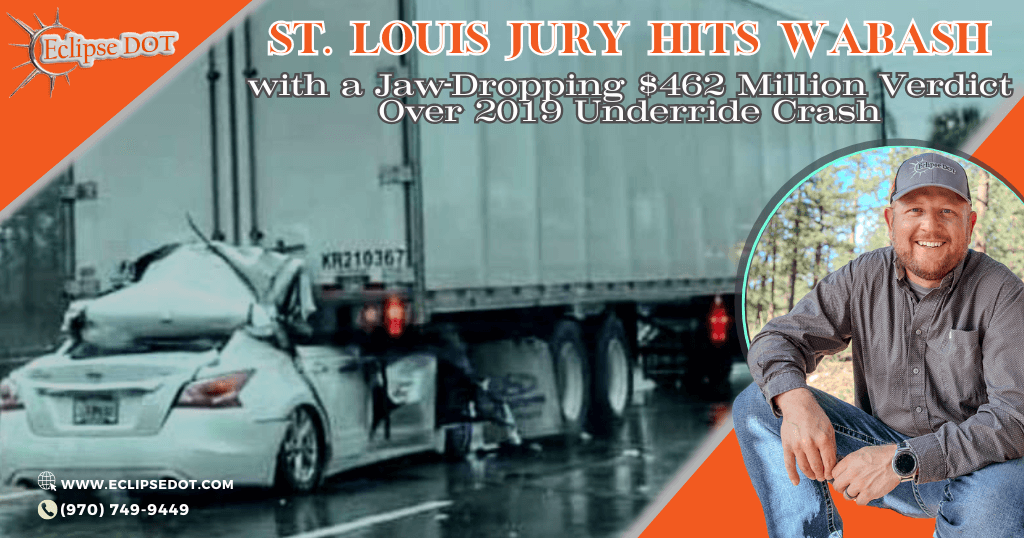When Rules Just Aren’t Enough
In a move that’s left the trucking world talking, a St. Louis jury dropped the hammer on Wabash National with a $462 million verdict. The verdict stems from a 2019 crash where a Volkswagen CC slammed into the back of a Wabash trailer on Interstate 55, instantly killing both Taron Tailor and Nicholas Perkins. But here’s where it gets tricky: the trailer, built in 2004, met every safety regulation on the books at the time. So why the massive payout? Let’s break it down.
This wasn’t just about a trailer built two decades ago following the rules—it was about what Wabash could have done. Tailor’s car was going 55 mph when it hit the trailer, causing the rear impact guard (RIG) to fail, letting the car slide underneath. The plaintiffs didn’t just accuse Wabash of building a subpar guard; they accused the whole trailer industry of dragging their feet on safer designs for decades(Transport Topics)(TheTrucker.com).
“We Followed the Rules” – Wabash’s Defense
Wabash didn’t just sit there and take it. They came out swinging with this defense: “We built the trailer to federal standards. What more do you want?” And they’ve got a point—sort of. Back in 2004, the trailer complied with every safety standard. But here’s where the argument crumbles. The plaintiffs claim Wabash and other manufacturers knew for years that these guards weren’t enough and still refused to upgrade them. According to them, it wasn’t about the law—it was about doing the right thing(Transport Topics)(TheTrucker.com).
Kristin Glazner, Wabash’s General Counsel, didn’t hold back, saying, “No rear impact guard or trailer safety tech could’ve stopped this.” Wabash believes the accident was tragic, but unavoidable, no matter how you slice it. Oh, and by the way, they claim the jury didn’t get the full story: Tailor’s blood alcohol level was over the legal limit, and neither he nor Perkins wore seatbelts. But Missouri law kept that evidence out of the trial. So, the jury didn’t hear that pretty important bit of info(TheTrucker.com)(Transport Topics).
The Conspiracy Plotline
But this case wasn’t just about one crash. The plaintiffs went for the jugular, alleging that Wabash—and the entire trailer industry—had been keeping safer tech off the market for decades. They presented evidence showing that manufacturers like Wabash had been fighting tougher underride safety standards since the 1960s. Why? It all boiled down to money. Implementing stronger rear guards would’ve cost them millions, so they stuck to the bare minimum(Simon Law PC)(Transport Topics).
The jury clearly didn’t buy Wabash’s defense. They slapped the company with $450 million in punitive damages. According to the plaintiffs’ lawyers, that’s about how much Wabash saved by not upgrading their safety guards over the past 30 years. Add in another $6 million for each victim’s family, and you’ve got yourself a nuclear verdict(TheTrucker.com).
The Fallout for Wabash—and the Industry
You can bet this case is making every trailer manufacturer in the country sit up and pay attention. If Wabash’s trailers are defective, then what about the rest of the industry? The verdict could lead to a flood of similar lawsuits, and that’s a big deal. Wabash says they’re reviewing their legal options, but they’ve got an uphill battle. The company’s bottom line might be about to take a serious hit(Simon Law PC).
And this goes beyond just financial damage. It’s also shining a light on trailer safety standards. The National Highway Traffic Safety Administration (NHTSA) recently upped the ante with new regulations, but safety advocates say it’s still not enough. Groups like the Truck Safety Coalition are calling for even tougher rules, especially when it comes to side underride guards(Transport Topics)(TheTrucker.com).
What’s Next?
So, what’s the takeaway here? Well, for starters, trailer manufacturers can’t just hide behind outdated regulations anymore. Even if you followed the rules back then, if you knew about safer options and didn’t implement them, you could be in trouble. Wabash may have built a trailer that complied with federal law, but the jury decided that wasn’t good enough. And with a $462 million price tag, you can bet the entire industry is paying attention.
For those keeping score at home, this case isn’t just a slap on the wrist—it’s a wake-up call. The verdict shows that juries aren’t afraid to punish companies for playing it safe with regulations when they should’ve been going the extra mile on safety. Whether Wabash appeals the decision or not, this case has already made its mark.
So, what’s next for Wabash? Only time will tell. But one thing’s for sure—trailer manufacturers everywhere are probably double-checking their safety specs right about now. You never know when the next nuclear verdict might hit.
For more in-depth details, you can check out the full story from (Transport Topics)(Land Line)(TheTrucker.com)(Simon Law PC)Land Line, The Trucker, and Simon Law.
Gain exclusive access to our CDL & DOT Compliance articles with a trial at DOTDocs.com. And don’t forget to claim your FREE micro audit at THE ECLIPSE DOT MICRO AUDIT. Ready for seamless operations? Discover the difference today!



6 thoughts on “St. Louis Jury Hits Wabash with a Jaw-Dropping $462 Million Verdict Over 2019 Underride Crash”
Thanks for sharing. I read many of your blog posts, cool, your blog is very good.